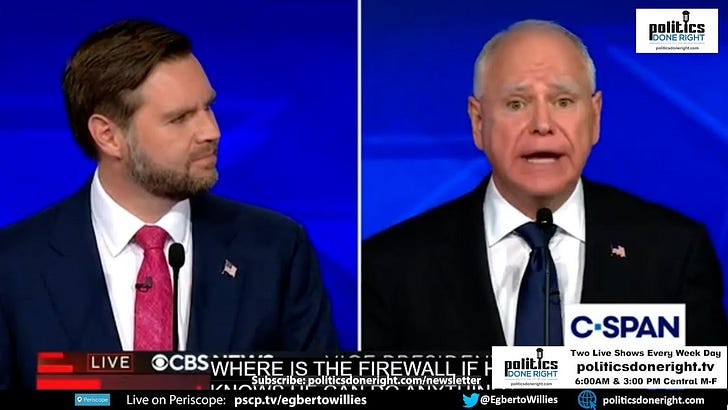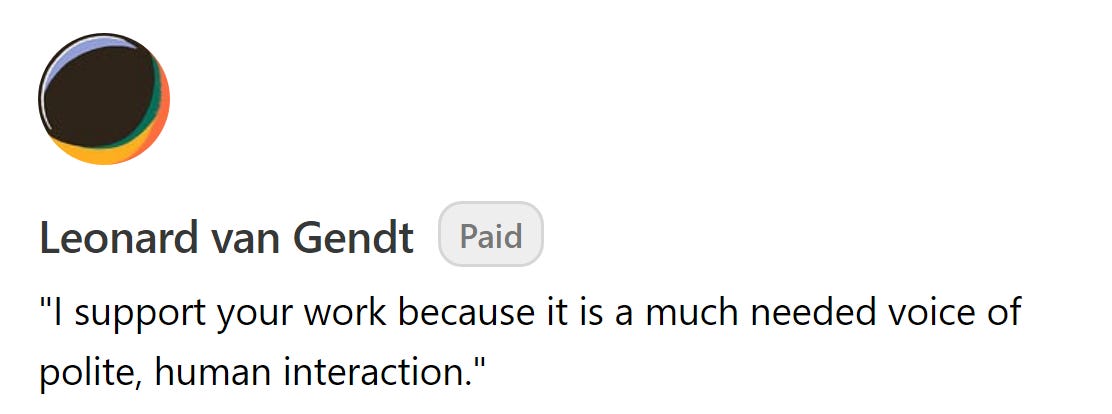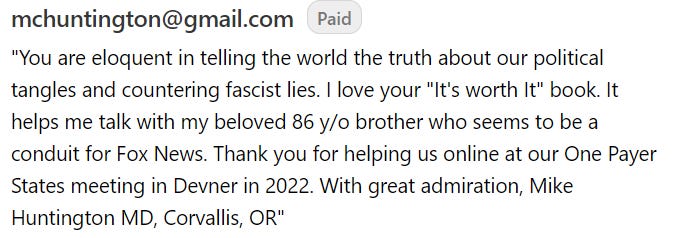Tim Walz won the debate when JD Vance could not admit that Trump lost the 2020 election.
Tim Walz won the debate on speaking the truth. For the uninformed, JD Vance likely drew a draw. Vance lost the debate when he could not say Trump lost the 2020 election.
NOTE: We need 9 new paid subscriptions to meet September’s goal! Please make a difference.
We are grateful for our Paid Subscribers and Free Subscribers. In this political climate, we need several hundred more Paid Subscribers. Misinformation funded by the deep pockets of our Oligarchy floods the internet. We are using all our platforms on-air, online, and in publications to counter that. We ask that you invest the equivalent of less than a coffee to ensure we can keep doing this effectively. Please invest in a Democracy that serves all of us by becoming a paid subscriber. It comes with many benefits.
Tim Walz won the debate as JD Vance failed at the truth.
In a pivotal moment during a recent debate, Democratic Governor Tim Walz seized the upper hand by posing a critical question to Republican Senator JD Vance: Did Donald Trump lose the 2020 election? JD Vance’s failure to provide a straightforward answer highlighted the fundamental tension within the Republican Party, particularly its allegiance to Donald Trump and his baseless claims of election fraud. This exchange underscored Vance’s reluctance to confront the truth and showcased Walz’s ability to expose the lingering dangers of Trump’s hold on the GOP.
Like many Republicans entrenched in Trump’s orbit, JD Vance dodged Walz’s direct question. His refusal to admit that Trump lost the 2020 election mirrors a disturbing trend among GOP leaders. Rather than embracing facts, they pander to Trump’s fabricated narrative of a “stolen” election. This is not simply a matter of political debate—it is an issue of democracy and truth. When elected officials cannot acknowledge an election’s legitimacy, they are undermining the very foundation of democratic governance.
Vance’s response was striking in its evasiveness. Instead of answering the question, he diverted attention to a fabricated controversy, asking, “Did Kamala Harris censor Americans from speaking their mind in the wake of the 2020 COVID situation?” This kind of deflection is emblematic of the MAGA strategy. They turn to conspiracy theories or red herrings when faced with inconvenient truths. Vance’s pivot to a debunked claim about censorship serves only to distract from the core issue: Donald Trump lost the 2020 election, and JD Vance, like many Republicans, is too afraid to say so.
Governor Tim Walz, on the other hand, responded with clarity and conviction. Walz pointed out that this isn’t a debate—Trump lost, and the facts are indisputable. He also emphasized the broader danger of Trump’s influence, particularly how Trump expects unwavering loyalty, even if it means distorting reality. Walz questioned where the “firewall” within the Republican Party is when Trump pushes these false narratives. He reminded the audience of former Vice President Mike Pence’s decision to certify the election results, which makes Pence a pariah within Trump’s circle. Walz’s point was clear: If Republicans like Vance refuse to confront Trump, they are complicit in his ongoing assault on democracy.
JD Vance’s performance during the debate encapsulates the broader problem within the Republican Party. The party has become beholden to Trump’s lies, and figures like Vance are unwilling to break from the former president, even when the stakes are as high as the integrity of American democracy. This dynamic raises significant concerns about the future of the GOP and its role in national politics. If Republicans cannot admit to a basic fact—that Joe Biden won the 2020 election—how can they be trusted to govern effectively and uphold democratic norms?
Tim Walz’s debate handling highlighted his leadership and commitment to truth. In contrast, Vance’s response illuminated his fear of alienating Trump’s base. This exchange is indicative of a broader trend: Republicans who remain tethered to Trump and his lies are prioritizing political survival over the truth. For progressive voters and observers, this moment serves as a reminder of the critical importance of standing up for facts, particularly in an era where disinformation has become a central tool of political manipulation.
Progressives can take heart in Walz’s performance. His direct challenge to Vance revealed the cracks in the GOP’s armor. Despite the performative confidence of figures like Vance, their reluctance to confront Trump’s lies is a sign of weakness, not strength. This is an opportunity for progressives to continue pushing for transparency, truth, and accountability, especially as the country approaches future elections.
Moreover, Walz’s insistence on calling out Trump’s falsehoods aligns with most Americans’ beliefs. According to numerous polls, most Americans accept the outcome of the 2020 election and reject the conspiracy theories peddled by Trump and his loyalists. In today’s political landscape, Walz’s approach—boldly standing for truth in the face of lies—is precisely what is needed.
As Walz stated during the debate, this isn’t about partisanship but safeguarding democracy. The inability or unwillingness of figures like JD Vance to acknowledge reality is a grave threat to the democratic process. Progressives must continue to emphasize the importance of truth, even when it is inconvenient for the other side.
Tim Walz won the debate not because of rhetoric or flash but because he stood firmly on the side of truth. JD Vance’s refusal to admit that Trump lost the 2020 election exemplifies the broader moral bankruptcy of the current Republican Party. It is up to leaders like Walz and the progressive movement to keep fighting for a future where facts, not fantasies, guide the political discourse.
Viewers are encouraged to subscribe and join the conversation for more insightful commentary and to support progressive messages. Together, we can populate the internet with progressive messages that represent the true aspirations of most Americans.
Can we count on your help to reach our goal of 200 needed new paid subscriptions by the end of the month?
The other side has big donors and everyday citizens who invest heavily in platforms that lie and misinform. All we have is you. So, please invest in our media outlet by clicking the subscribe button below to become a paid subscriber. You won’t miss that coffee, but it will make a difference in our politics as we spread the truth about our policies and progressive politics. All paid subscribers get to read my five books on this platform and all subsequent books I write. They will also be privy to subsequent incentives.









Au contrere, mon frère... IMO it was pretty much a draw. No clear winner. Based strictly on first impressions, very important in a TV debate, Vance had the better presentation of himself. Early on, Walz spent much of the time with his face clenched and a bit hunched over, as if he were concentrating too hard instead of relaxing and having fun with it. (Harris pulled this off extremely well.)
Later, Walz did loosen up quite a bit, but still. Regarding talking points, Vance is obviously a pathological liar, but he did it well. Walz held his own by directly addressing the viewing audience a few times, a good narrative tactic. Also, he admitted straight-up that he misspoke (i.e. exaggerated in what was, eh, essentially a lie) regarding carrying weapons in a war.
Partisans on each side can claim a victory and, as noted, I think no one took home the silver cup. But if I had to make a judgment call, I'd say Vance edged out a victory because of the way he presented himself.
p.s. Compared with the vitriol in this election cycle, the degree to which the two candidates treated each other with respect and even with glimmers of cordiality was striking. Kinda funny, that's what happens when two midwestern guys go toe-to-toe. To me it almost felt like satire -- like characters from Garrison Keillor's Lake Wobegon. Arguably, that was the real win in this debate.